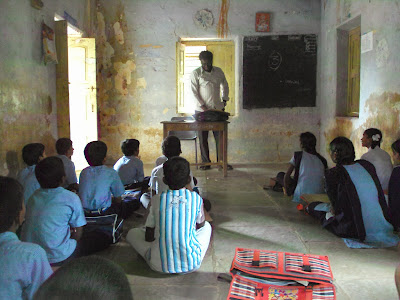It’s a known fact that peasants in the country are facing many
problems since ages, they are in debts, can’t repay the loans, interest on the
taken loans growing day by day and much more. Hopeless peasants are committing suicide and
others are migrating in search of work. The migrant labours are mostly employed
in construction work. According to 2010 census, there are 29.8% population
living with less than $1.25 wage per day.
Children of laborers:
There is a saying - ‘doctor child becomes a doctor, actor
child becomes an actor and a labor child will become a labor’. The kid of a
laborer is exposed to sand and cement at an early age, as their parents accompany their children
to the work place. As a result, these kids get used to construction work environment, which in
turn leads them to future labours at early teens. Some elder kids stay
at home to take care of their younger siblings and doing household chores.
Considering some sample families of migrant labours - a 2
dozen families live in a tin shed dwelling near Hitech city, Hyderabad. The
sheds were laid by a construction group as temporary shelter for the labourers.
People in this community range from North to South of India who came to
Hyderabad in search of work. Kids of these people are out of school; they’re
spending their childhood on the roads or doing household chores. When I
approached their parents, I realised that some parents want their children to
support the family by doing the same labour work.
But there are some parents want to send
their kids to school; they want to give their children good quality of living. It’s really good to see a positive mindset in few parents though.
Last from right is Bittu of 10 years old.
They are migrants from MP state. Bittu’s parents are labours, they go to work at 8am and return at 5pm. Meanwhile, he looks after his two siblings of age 5 years and 2 years. He also cooks, washes utensils, cleans the house etc. However, he never been to school; his parents are not interested to send him school.
From first left is Yasmine, age 10 years.
She is a school
dropout and a single parent. I urged and guided her mother to give her
child good education she deserves. She came forward to join her girl in the school.
‘The New Blue Dress’, a beautiful story of a pretty girl who
inspires everyone in her community. Similarly, Yasmine, inspired other kids in
the neighbourhood. Two more kids have joined the school with little guidance and
information provided by us.
Government is pumping a lot funds through a number of
schemes for educating the kids under RTE. Most the people in the country are unaware of the benefits they deserve. It’s the duty of every responsible citizen, that if they
encounter any boy or girl out of school approach their parents and tell them
the benefits of going to school. With little research give some list of schools
nearby. It might inspire them; perhaps they will send the child to school. It’ll
cost some productive time of your daily schedule, but you can make a
difference in the lives of the little buds of our nation.
We need to inspire and stimulate the parents of so many Bittu's in this world. I agree, there are some NGO's working towards it. But it's the part of every citizen to work towards the achievement of Education for all*













































